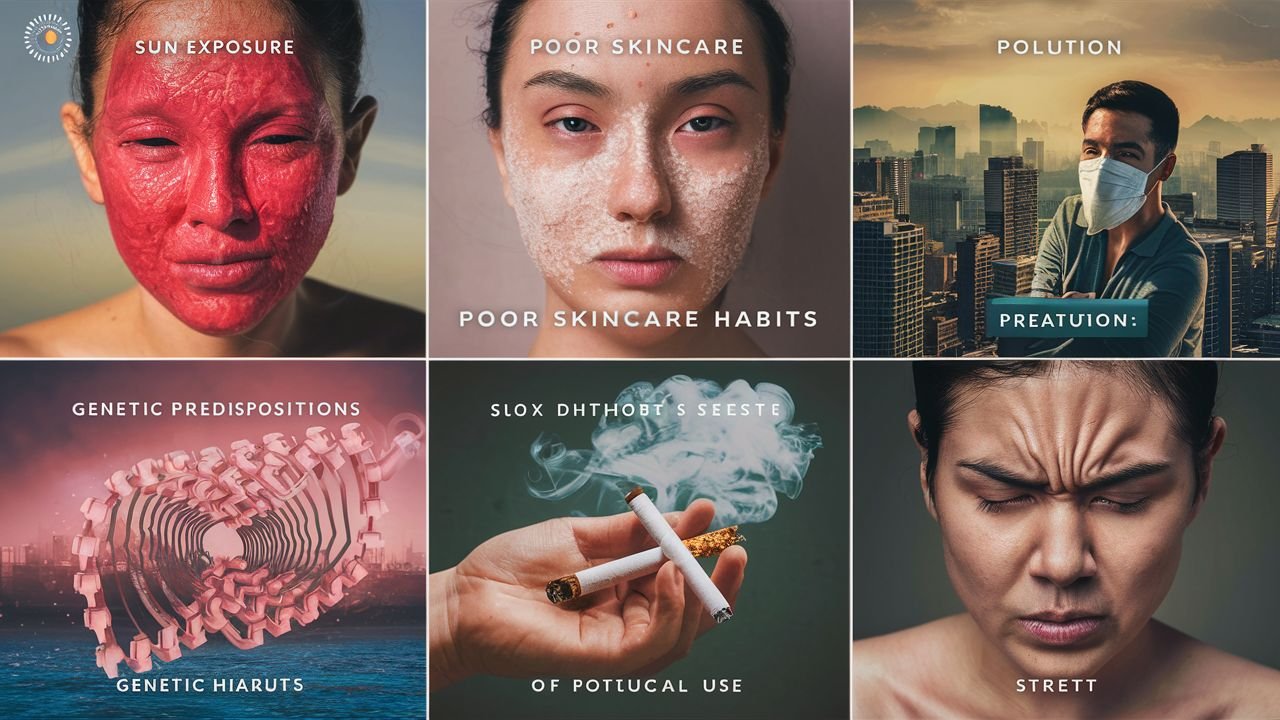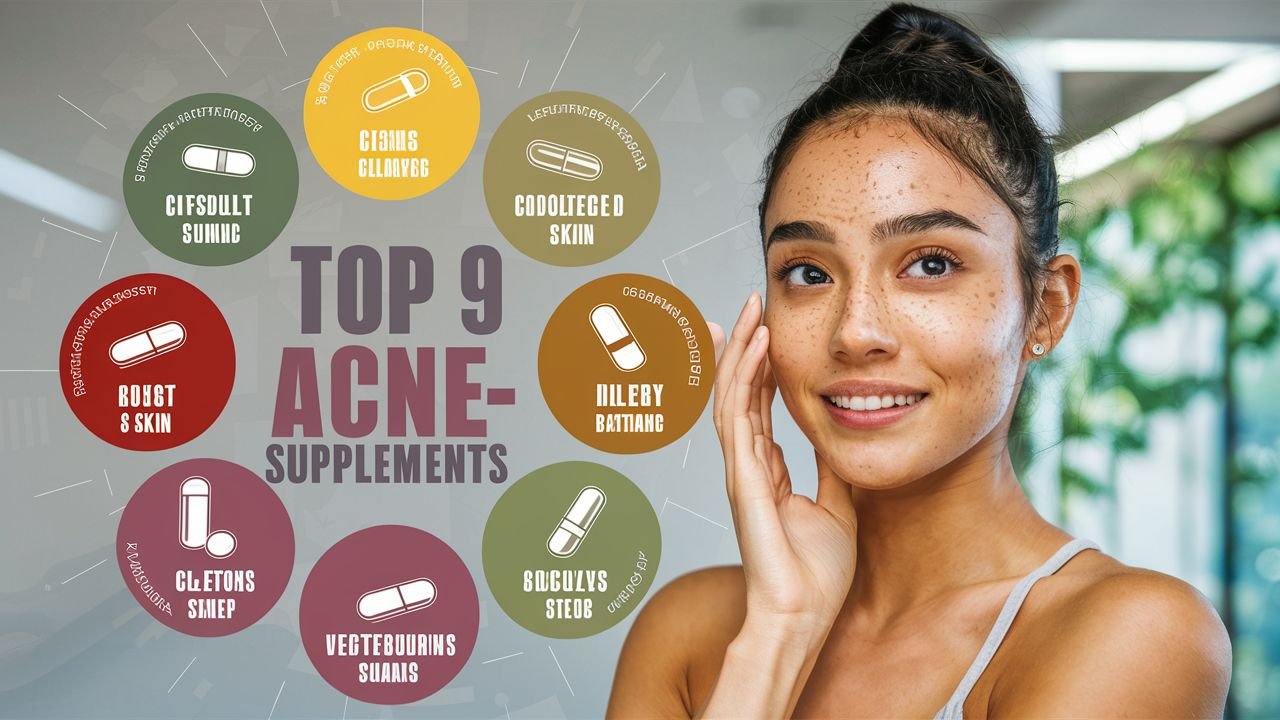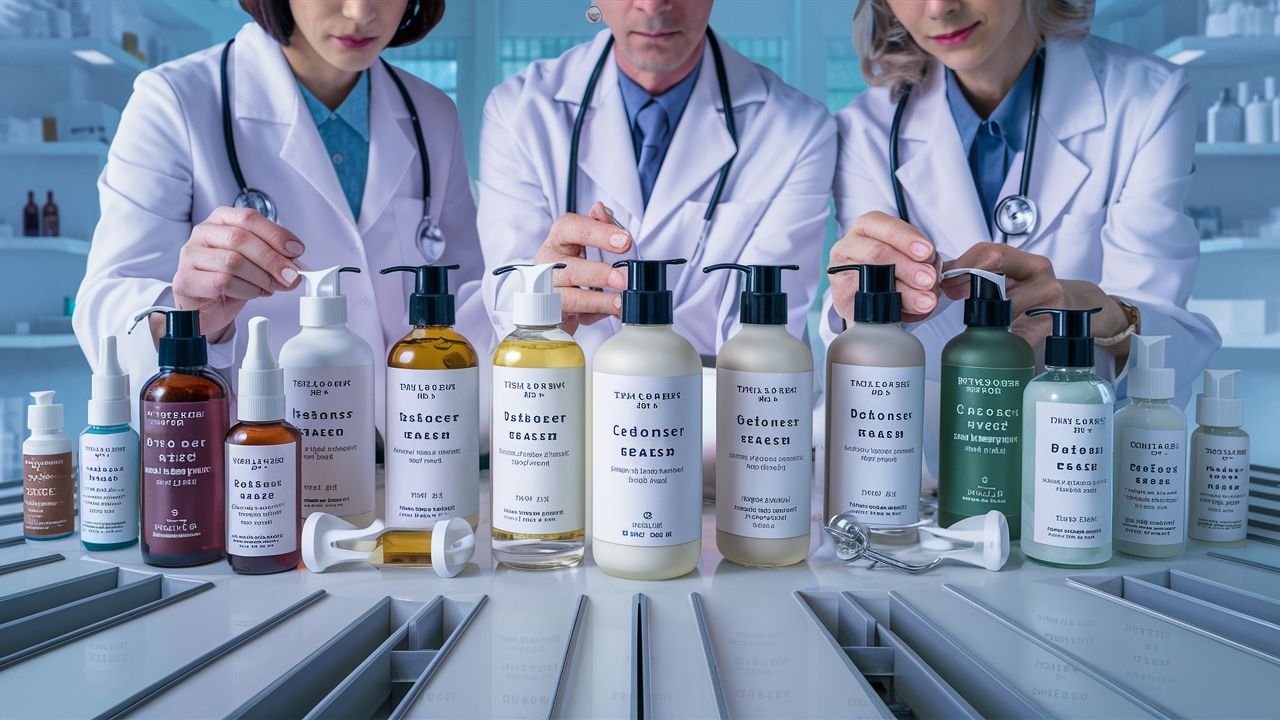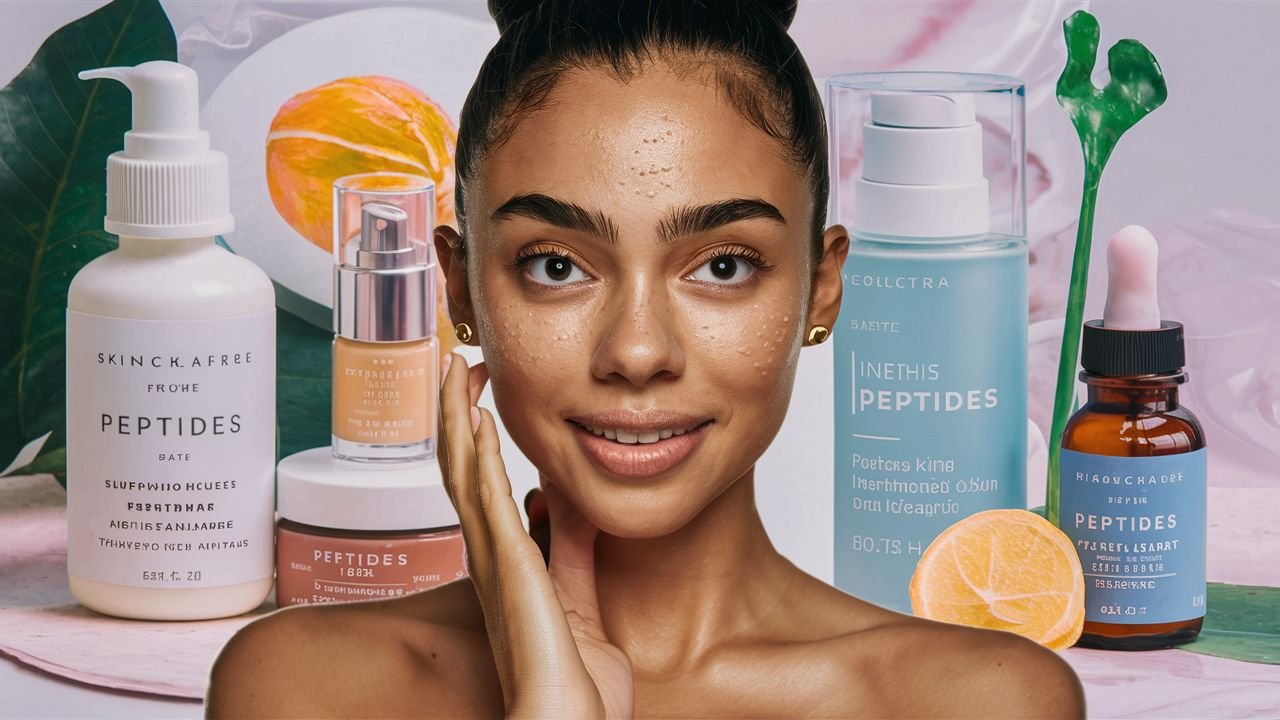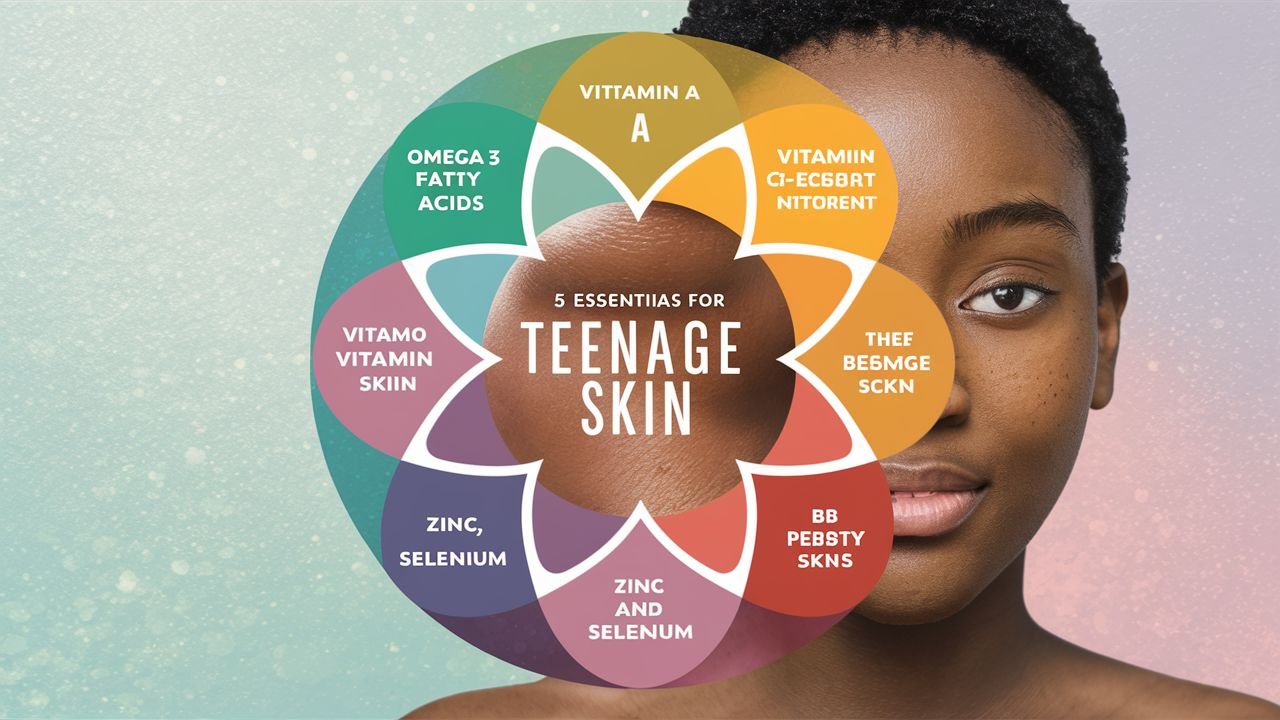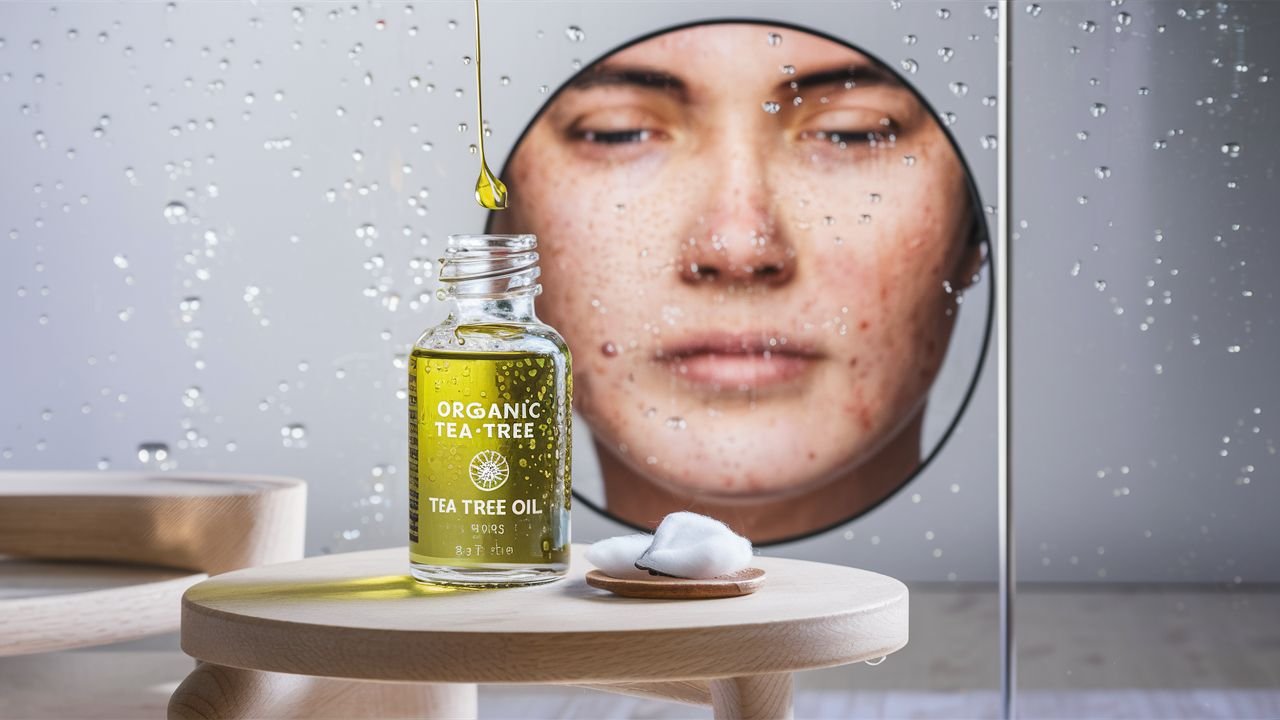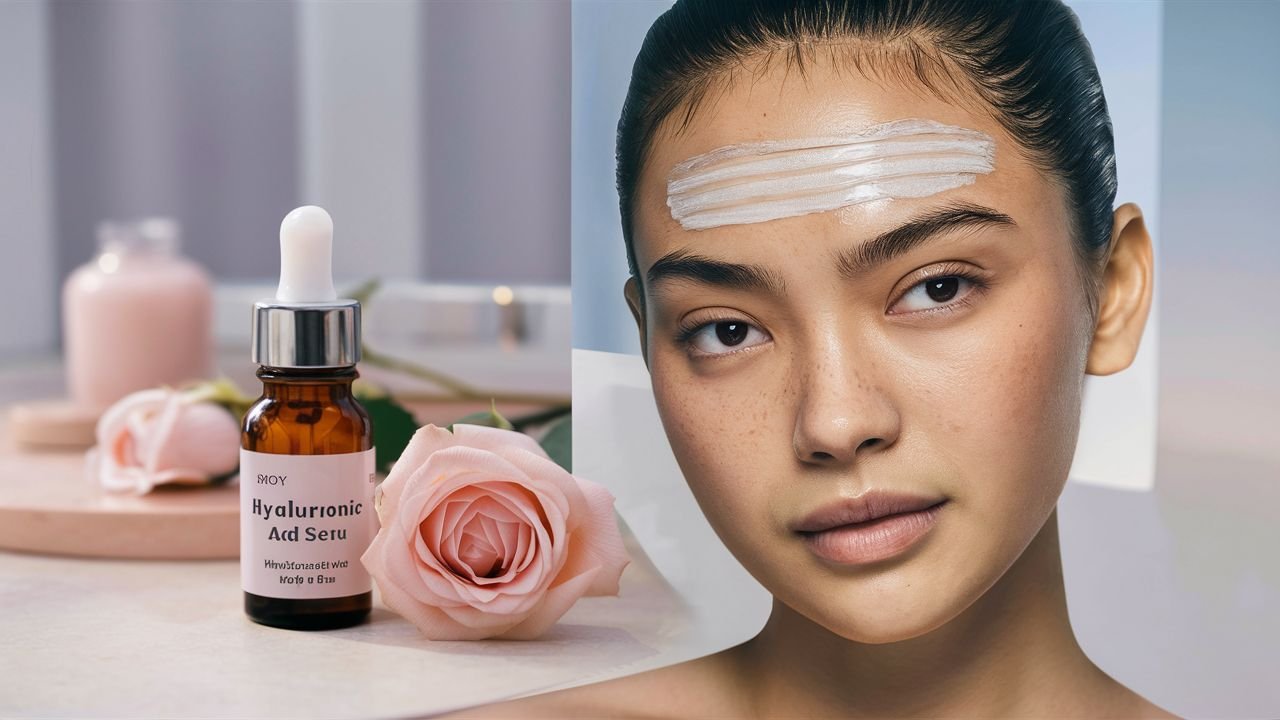Have you ever wondered what causes skin damage? Is it solely due to factors like sun exposure or poor skincare habits? Or could there be other culprits that we might not be aware of?
In this article, we delve into the top 6 common causes of skin damage and unravel the mysteries behind them. From external factors that harm your skin to genetic predispositions that play a role, we explore the various triggers of skin damage and how they can affect your skin health.
Inflammation
Chronic inflammation is a significant cause of skin damage. It can be triggered by various factors, including acne, eczema, and autoimmune disorders like psoriasis. When inflammation occurs, it can impair the skin’s barrier function and lead to increased moisture loss, sensitivity, and redness. Additionally, chronic inflammation disrupts collagen production, which can contribute to the development of wrinkles and fine lines. It is crucial to manage inflammation through proper skincare and lifestyle habits in order to maintain skin health and prevent damage.
One of the ways inflammation damages the skin is by compromising its barrier function. The skin’s barrier is responsible for protecting against external factors, such as pollutants and irritants, and retaining moisture. When inflammation occurs, the skin’s barrier becomes weakened, making it more susceptible to damage. This can result in increased moisture loss, leading to dryness, tightness, and dehydration.
Inflammation also leads to increased skin sensitivity and redness. The inflammatory response triggers the release of certain chemicals that cause blood vessels to dilate, resulting in redness and an overall flushed appearance. For individuals with sensitive skin, inflammation can exacerbate the symptoms, causing heightened sensitivity and discomfort.
“The skin is a mirror reflecting everything inside us.” – Dr. Murad
In addition to compromising the skin’s barrier function and causing sensitivity, inflammation disrupts collagen production. Collagen is a vital protein that provides structure and elasticity to the skin. When inflammation occurs, it triggers the release of enzymes that break down collagen fibers, leading to a loss of firmness and the development of wrinkles and fine lines.
Managing inflammation effectively is crucial for maintaining skin health and preventing damage. Incorporating anti-inflammatory skincare ingredients, such as niacinamide, green tea extract, and chamomile, can help reduce inflammation and soothe the skin. Adopting a healthy lifestyle that includes a balanced diet, regular exercise, and stress management techniques can also contribute to reducing inflammation.
Top Anti-Inflammatory Skincare Ingredients:
| Skincare Ingredient | Benefits |
|---|---|
| Niacinamide | – Reduces inflammation – Improves skin barrier function – Regulates sebum production |
| Green Tea Extract | – Calms and soothes skin – Provides antioxidant protection |
| Chamomile | – Anti-inflammatory and soothing – Relieves skin redness and irritation |
By understanding the role of inflammation in skin damage and implementing effective strategies to manage it, individuals can protect their skin and maintain its health and vitality.
UV Radiation
Exposure to UV radiation from the sun and artificial sources like tanning beds is a major cause of skin damage. UV radiation can penetrate the skin and lead to the development of sunburns, premature aging, and skin cancer.
Protecting skin from UV rays is crucial for maintaining skin health. By practicing effective sun protection measures, you can minimize the harmful effects of UV radiation and prevent skin damage. Here are some key strategies:
- Wear sunscreen: Regularly apply a broad-spectrum sunscreen with a high SPF (sun protection factor) to protect your skin from both UVA and UVB rays. Choose a sunscreen that suits your skin type and reapply every two hours or after swimming or sweating.
- Seek shade: When the sun’s rays are strongest, typically between 10 a.m. and 4 p.m., seek shade or create your shade using umbrellas, hats, and clothing. This reduces direct exposure to UV radiation.
- Wear protective clothing: Cover your skin as much as possible with lightweight, loose-fitting clothing, and opt for clothing with UPF (Ultraviolet Protection Factor) for added sun protection.
By following these precautions, you can significantly reduce the risk of sun damage to the skin caused by UV radiation. Remember that skin damage from UV rays can occur even on cloudy days, so it is essential to incorporate sun protection into your daily routine.
Hormonal Changes
Hormonal changes can have a significant impact on the skin and contribute to skin damage. Imbalances in hormone levels can lead to various skin issues, including hormonal acne, breakouts, and inflammation. Additionally, hormonal fluctuations during menopause can affect the skin’s health and appearance, causing dryness, thinning, and loss of elasticity.
Managing hormonal skin issues and preventing further damage requires a tailored skincare routine. Gentle cleansing is essential to remove impurities and excess oil without stripping the skin of its natural moisture. Targeted treatments, such as serums or creams containing ingredients like salicylic acid or retinoids, can help regulate sebum production and reduce acne breakouts.
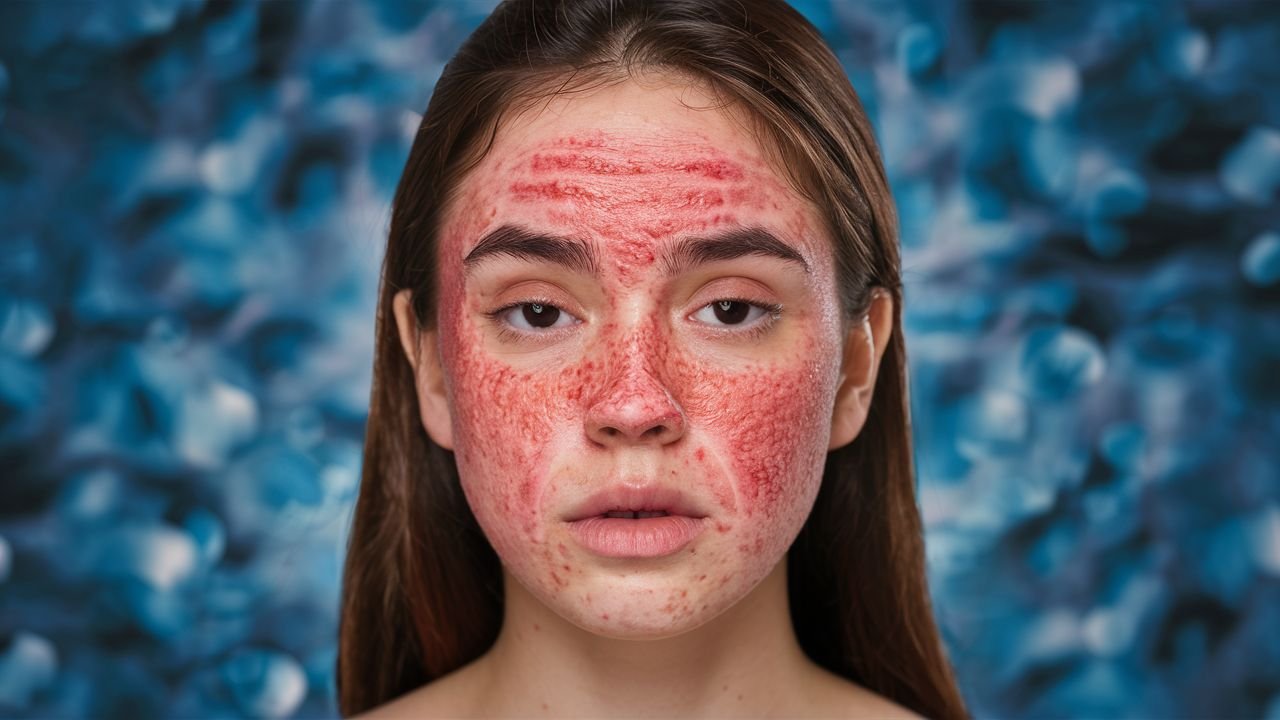
Hormonal Acne
Hormonal acne is a common condition that occurs due to fluctuations in hormone levels, particularly androgens like testosterone. These hormonal imbalances can stimulate the sebaceous glands to produce excess sebum, leading to clogged pores and the development of acne.
While hormonal acne can be challenging to manage, incorporating skincare products with ingredients like benzoyl peroxide, salicylic acid, or tea tree oil can help reduce inflammation and control acne breakouts. It is also important to maintain a consistent skincare routine, avoid touching or picking at the skin, and follow a healthy lifestyle to support overall skin health.
Menopause and Skin Health
Menopause is a natural stage in a woman’s life that involves a decline in hormonal activity, including a decrease in estrogen levels. This hormonal shift can have a significant impact on the skin, leading to changes in texture, hydration, and elasticity.
During menopause, the skin may become drier, thinner, and more prone to wrinkles and sagging. It is crucial to prioritize hydration by using moisturizers with ingredients like hyaluronic acid and ceramides. Sun protection is also essential, as the skin becomes more vulnerable to UV damage. Regular use of broad-spectrum sunscreen with a high SPF can help prevent further skin damage.
Skincare Tips for Managing Hormonal Changes
| Tips | |
|---|---|
| 1 | Use gentle cleansers to remove impurities without stripping the skin. |
| 2 | Apply targeted treatments with ingredients like salicylic acid or retinoids to regulate sebum production and reduce acne breakouts. |
| 3 | Avoid touching or picking at the skin to prevent further inflammation. |
| 4 | Follow a healthy lifestyle with a balanced diet, regular exercise, and stress management techniques. |
| 5 | Keep the skin hydrated by using moisturizers with hyaluronic acid and ceramides. |
| 6 | Protect the skin from UV damage by wearing broad-spectrum sunscreen with a high SPF. |
Environmental Pollutants
Exposure to environmental pollutants can have a detrimental impact on skin health, leading to skin damage and premature aging. Common environmental pollutants include air pollution, cigarette smoke, and heavy metals. These pollutants can penetrate the skin and generate free radicals, causing oxidative stress, inflammation, and a breakdown of collagen and elastin fibers. The damaging effects of environmental pollutants on the skin cannot be ignored, making it essential to take proactive steps to protect and maintain skin health.
To safeguard your skin from the harmful effects of environmental pollutants, proper cleansing is crucial. An effective skincare routine should include a gentle cleanser to remove impurities and pollutants from the skin’s surface. Additionally, using anti-pollution skincare products can provide an extra layer of defense by forming a barrier to shield the skin from further damage.
Furthermore, making lifestyle choices that minimize exposure to polluted environments can significantly benefit the skin. Avoiding smoking, which releases harmful chemicals that can damage the skin, is crucial for maintaining skin health. Additionally, opting for clean and sustainable living practices, such as reducing air pollution and using air purifiers, can help create a healthier environment for your skin.

The Impact of Pollution on Skin Health
The impact of pollution on skin health is multi-faceted. The generation of free radicals induced by environmental pollutants can lead to oxidative stress, which damages the skin’s cellular structure. This can result in accelerated aging signs, including wrinkles, fine lines, and uneven skin texture.
Moreover, exposure to environmental pollutants can trigger chronic inflammation in the skin. Inflammation disrupts the skin’s natural balance and can exacerbate existing skin conditions like acne, eczema, and rosacea. It can also degrade the skin’s barrier function, leading to increased sensitivity, redness, and skin barrier dysfunction.
“Environmental pollutants like air pollution and heavy metals can generate free radicals in the skin, leading to oxidative stress, inflammation, and premature aging.”
Protecting Skin from Pollutants
Protecting your skin from environmental pollutants is paramount to maintaining skin health and preventing damage. In addition to proper cleansing and using anti-pollution skincare products, other protective measures can be taken.
- Avoiding heavily polluted areas and staying indoors during peak pollution hours can minimize exposure to environmental toxins.
- Wearing hats, scarves, and sunglasses can provide physical protection against airborne pollutants.
- Implementing a diet rich in antioxidants, such as fruits and vegetables, can help combat the detrimental effects of pollution on the skin.
By adopting these protective measures and incorporating them into a comprehensive skincare routine, you can significantly reduce the negative impact of environmental pollutants on your skin, helping to maintain a healthy complexion and youthful appearance.
Poor Skincare Habits
Neglecting proper skincare habits can have detrimental effects on the skin, leading to skin damage and various skin issues. Failing to prioritize a consistent skincare routine can result in long-term consequences for your skin’s health and appearance.
Poor skincare habits include neglecting proper cleansing, skipping sunscreen, and using harsh or irritating products. These habits can compromise the skin’s natural barrier function, leaving it vulnerable to damage from external factors.
One of the most common poor skincare habits is not cleansing the skin regularly. Without regular cleansing, dirt, oil, and impurities can accumulate on the skin’s surface, clogging pores and leading to breakouts. Additionally, inadequate cleansing can prevent subsequent skincare products from effectively penetrating the skin, diminishing their effectiveness.
Another significant poor skincare habit is neglecting sunscreen. Sun exposure is a major contributor to skin damage, including sunburn, premature aging, and increased risk of skin cancer. Failing to use sunscreen or opting for insufficient sun protection can leave the skin vulnerable to harmful UV rays.
Using harsh or irritating products is another skincare habit that can lead to damage. These products can disrupt the skin’s natural balance, leading to dryness, sensitivity, and inflammation. Over time, they can compromise the skin’s overall health and appearance.
Establishing a consistent skincare routine that involves gentle cleansing, moisturizing, and sun protection is crucial for maintaining healthy skin and preventing damage. It’s important to select products specifically formulated for your skin type and concerns to optimize their effectiveness.
To emphasize the importance of good skincare habits, here’s a quote from dermatologist Dr. Ava Shamban:
“Neglecting proper skincare habits can have serious consequences for your skin’s health and appearance. Taking the time to establish a consistent skincare routine is an investment in the long-term vitality of your skin.”
Lifestyle Factors
Lifestyle factors play a significant role in the health and condition of our skin. Unhealthy habits and choices can contribute to skin damage and undermine its natural resilience and vitality. Let’s explore how various lifestyle factors can impact the health of our skin and what steps we can take to promote skin well-being.
Effects of Stress on Skin Health
Chronic stress can have detrimental effects on our skin. When we experience heightened stress levels, our bodies release stress hormones like cortisol, which can disrupt the skin’s natural balance. This disruption can lead to increased inflammation, breakouts, and impaired healing processes.
One study conducted by researchers at Stanford University found that chronic stress can worsen skin conditions such as psoriasis, eczema, and acne. The study also demonstrated a correlation between stress and accelerated skin aging.
To combat the effects of stress on our skin, it’s crucial to incorporate stress management techniques into our daily lives. This can include practices like meditation, deep breathing exercises, regular physical activity, and engaging in activities that bring joy and relaxation.
Unhealthy Habits and Skin Damage
Unhealthy habits, such as inadequate sleep, poor diet, and smoking, can take a toll on our skin’s health and appearance.
“Your skin is a reflection of your overall health.”
Insufficient sleep can disrupt the body’s natural regenerative processes, leading to a decrease in collagen production and impaired skin repair. This can result in a dull complexion, fine lines, and a lack of skin elasticity.
A poor diet lacking in essential nutrients can deprive the skin of the vital vitamins, minerals, and antioxidants it needs to stay healthy and vibrant. This can contribute to dryness, dullness, and reduced skin hydration.
Smoking, both firsthand and secondhand, affects the skin’s appearance and overall health. The toxins in cigarette smoke can cause premature aging, increase the formation of wrinkles, and restrict blood flow to the skin. This can result in a dull and sallow complexion.
In order to maintain healthy skin, it is essential to prioritize healthy habits. Getting sufficient sleep, eating a balanced diet rich in fruits, vegetables, and omega-3 fatty acids, and quitting smoking can all contribute to healthier skin.
Lifestyle Habits to Promote Skin Health
| Lifestyle Factors | Impact on Skin | Recommendations |
|---|---|---|
| Stress | Inflammation, breakouts, impaired healing | Practice stress management techniques like meditation and regular exercise. |
| Sleep | Dull complexion, fine lines, reduced skin elasticity | Aim for 7-9 hours of quality sleep each night. |
| Diet | Dryness, dullness, reduced hydration | Consume a balanced diet rich in fruits, vegetables, and essential nutrients. |
| Smoking | Premature aging, wrinkles, restricted blood flow | Quit smoking and avoid exposure to secondhand smoke. |
Genetic Factors
Genetic factors can have a significant impact on skin health and the development of certain skin conditions. Inherited skin conditions, such as eczema, psoriasis, and certain types of skin cancer, can be influenced by genetic predispositions.
Individuals with a genetic predisposition to these conditions may be more susceptible to skin damage. It is important for them to understand their family history and seek appropriate medical guidance to effectively manage and minimize the impact of genetic-related skin damage.
By identifying the genetic factors involved, healthcare professionals can tailor treatment and management strategies specifically to the individual’s needs. This personalized approach can help individuals with inherited skin conditions maintain their skin’s health and integrity more effectively.
Conclusion
Skin damage can occur due to various factors, including inflammation, UV radiation, hormonal changes, environmental pollutants, poor skincare habits, lifestyle choices, and genetic predispositions. Understanding these common causes is crucial for protecting and maintaining skin health. By adopting a comprehensive skincare routine, practicing sun protection, minimizing exposure to pollutants, managing stress levels, and making healthy lifestyle choices, individuals can safeguard their skin from damage and promote its overall well-being.
Inflammation, triggered by conditions like acne and eczema, can impair the skin’s barrier function and lead to sensitivity, redness, and collagen depletion. Protection from UV radiation, both from the sun and artificial sources, is essential for preventing sunburns, premature aging, and skin cancer. Hormonal changes during events like menopause can result in dryness, thinning, and loss of elasticity, requiring targeted skincare interventions. Exposure to environmental pollutants such as air pollution and cigarette smoke can generate free radicals, leading to oxidative stress and premature aging. Neglecting proper skincare habits, like failing to cleanse regularly or use sunscreen, can compromise the skin’s barrier function and result in dryness, sensitivity, and acne.
Lifestyle factors, including chronic stress, lack of sleep, unhealthy diets, and smoking, can also contribute to skin damage. Managing stress, prioritizing adequate sleep, adopting a healthy, nutrient-rich diet, and quitting smoking are all crucial for maintaining skin health. Additionally, genetic factors can play a role in skin damage, particularly for individuals with inherited skin conditions. Understanding one’s genetic predispositions and seeking appropriate medical guidance is essential for effectively managing these conditions.
By taking proactive measures to protect the skin and addressing the common causes of skin damage, individuals can preserve the integrity and vitality of their skin. Prioritizing a comprehensive skincare routine, practicing sun protection, minimizing exposure to pollutants, managing stress levels, and making healthy lifestyle choices are all integral parts of preserving skin health and preventing damage. With these strategies in place, individuals can achieve and maintain radiant, healthy skin for years to come.

